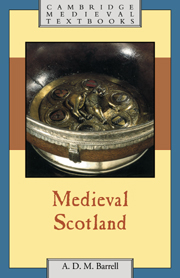Book contents
- Frontmatter
- Contents
- List of figures
- Preface
- List of abbreviations
- Maps
- 1 Early medieval Scotland
- 2 Feudal Scotland
- 3 The transformation of the Scottish church
- 4 The consolidation of the Scottish realm
- 5 The Wars of Independence
- 6 The Stewart kings
- 7 Crown and nobility in later medieval Scotland
- 8 The road to Reformation
- Conclusion
- Select bibliography
- Index
- Title in the Series
Conclusion
Published online by Cambridge University Press: 05 June 2012
- Frontmatter
- Contents
- List of figures
- Preface
- List of abbreviations
- Maps
- 1 Early medieval Scotland
- 2 Feudal Scotland
- 3 The transformation of the Scottish church
- 4 The consolidation of the Scottish realm
- 5 The Wars of Independence
- 6 The Stewart kings
- 7 Crown and nobility in later medieval Scotland
- 8 The road to Reformation
- Conclusion
- Select bibliography
- Index
- Title in the Series
Summary
This book has been primarily concerned with the five centuries between the accession of Malcolm Canmore and the Reformation Parliament. Inevitably, this period saw considerable political, ecclesiastical and social developments within Scotland and changing relations with the outside world. There is no single, unifying factor which explains how the Scottish kingdom evolved as it did or why its history differs from that of other parts of the British Isles. Rather, medieval Scotland must be examined from the standpoint of a number of overlapping and sometimes contradictory themes.
The extent of royal power in Scotland was affected by both geographical realities and strong provincial identities. The twelfth- and thirteenth-century kings were responsible for the introduction of new administrative structures, many imported from Norman England, and they strove to consolidate their authority by using trusted agents to act on their behalf in the peripheral regions of their realm. Freskin and his descendants in and beyond Moray, the Bruces in Annandale, the Stewarts in the Clyde estuary and, somewhat later, the Comyns in Buchan and Badenoch were all employed to control dangerous areas where the crown's influence was reduced by distance or the existence of powerful local lords. These men all belonged to immigrant families, and their role in Scottish history can give a misleading impression of the significance of feudalisation and the introduction of Anglo-Norman institutions.
- Type
- Chapter
- Information
- Medieval Scotland , pp. 263 - 267Publisher: Cambridge University PressPrint publication year: 2000



